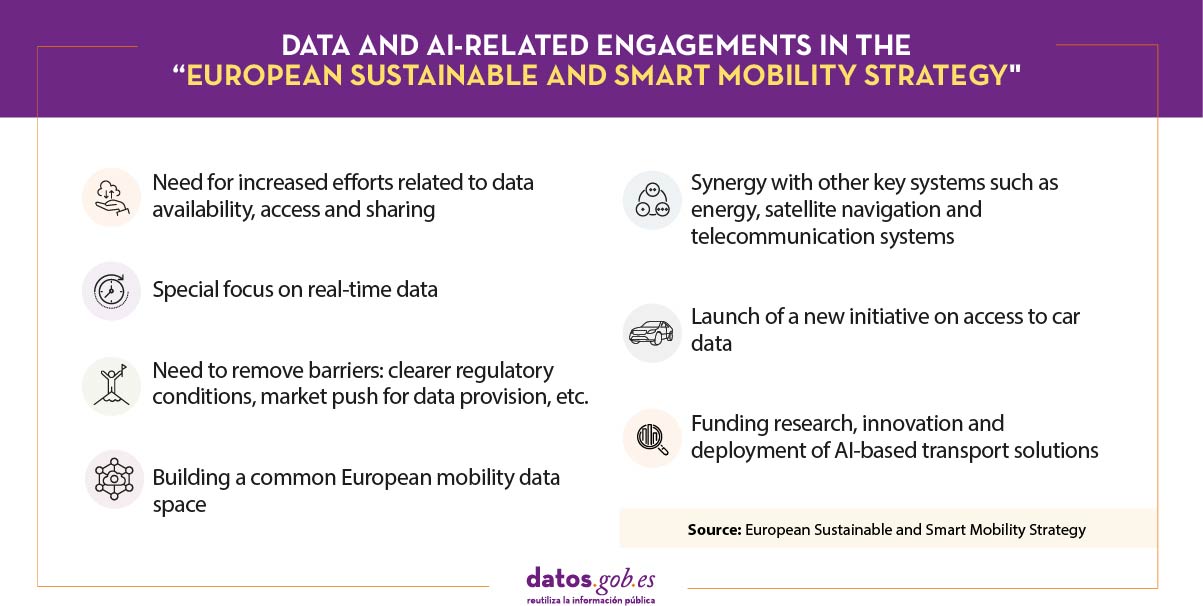
More than two years ago we started 2019 very hopeful about the progress that was being made in Spain regarding the openness of data related to transport and mobility, after a few years in which there had not been much progress. Although there is still room for improvement, especially in the availability of open data in real time, the fact that applications in the transport category already represent 20% of the total published on the datos.gob.es portal serves as an indicator of progress in this period.
In these two years, the pace of innovation in everything related to the use of data and artificial intelligence has been accelerated not only by technological progress, but also by a significant legislative impulse, both at European and national level. For example, the new Directive (EU) 2019/1024 considers data related to mobility and transport to be among the six groups declared to be of high value for their considerable benefits to society, the environment and the economy. Therefore, their momentum has been considered in the new mobility strategy.
European framework for mobility data
The European data strategy published in 2020 has among its objectives to create a single data market that ensures Europe's global competitiveness and data sovereignty through the creation of common European data spaces in nine strategic sectors, capable of ensuring that more data are available for use in the economy and society. Actions leading to the development of these data spaces are being channelled through the different strategies that the European Commission is developing to deliver on the priorities set for the period 2019-2024. Some examples already under development are the common manufacturing data space or the common agricultural data space.
As regards transport, in December 2020 the European Commission presented its "Sustainable and Smart Mobility Strategy" accompanied by an action plan of 82 initiatives for the next 4 years that will contribute to achieving the objectives of the European Green Pact. This strategy lays the groundwork for how the EU transport system must achieve its green and digital transformation to become more resilient to future crises.
Although the role of data is present in most of the points, among the ten key actions there is one that focuses exclusively on the role of data. In Action 7: "Innovation, data and artificial intelligence for smarter mobility", in addition to the objectives related to fostering innovation in general and building adequate digital infrastructures, the following points related to data and artificial intelligence stand out:

- The Commission stresses the need to step up efforts related to data availability, access and exchange in order to make the digital transformation of the transport and mobility sector a reality.
- It recognises that the availability of data and statistics is also essential, especially real-time data, as it enables better services to citizens or transparency of supply chains in freight transport.
- The need to remove barriers such as unclear regulatory conditions, the absence of an EU market for data provision, the lack of an obligation to collect and share data or misgivings about data sovereignty, among others, is highlighted.
- The commitment to propose further actions to build a common European data space for mobility data, set out in the Data Strategy, is developed. This sets the objective of collecting, connecting and making data available to achieve the objectives of sustainability and multimodality.
- Of particular relevance is the commitment that the mobility data space should work in synergy with other key systems such as energy, satellite navigation and telecommunications.
- It deals in a very differentiated way with access to vehicle data where the Commission is committed to present a new initiative on access to vehicle data, through which it will propose a balanced framework to ensure fair and efficient access to vehicle data for mobility service providers.
- The Commission plans to fund research, innovation and deployment of transport solutions based on artificial intelligence through the Horizon Europe and Digital Europe programmes, recognising that artificial intelligence is central to the automation of transport in all its modes. In this context, the Commission will support test and experimentation centres dedicated to AI for smart mobility.
This is certainly a very ambitious set of commitments that must also be compatible with EU data protection rules and ensure a level playing field for data in the value chain, so that innovation can flourish and new business models emerge. Otherwise operators would perceive that the common mobility data space is not secure and reliable for sharing their data and it would be very difficult to meet the ambitious targets that already by 2030 aim for automated mobility to be deployed on a large scale and for multimodal passenger transport to be a reality supported by integrated e-ticketing.
Contenido elaborado por Jose Luis Marín, Senior Consultant in Data, Strategy, Innovation & Digitalization.
The contents and views expressed in this publication are the sole responsibility of the author.